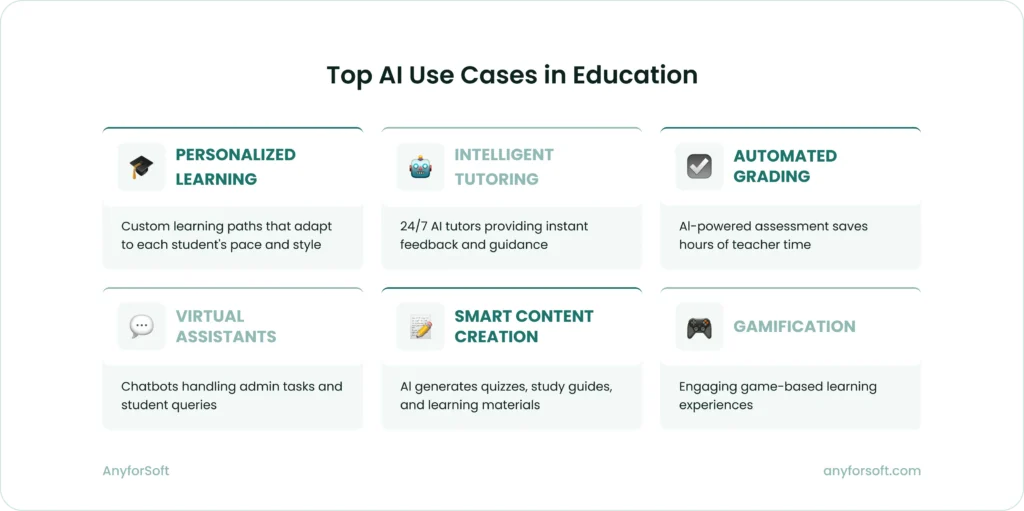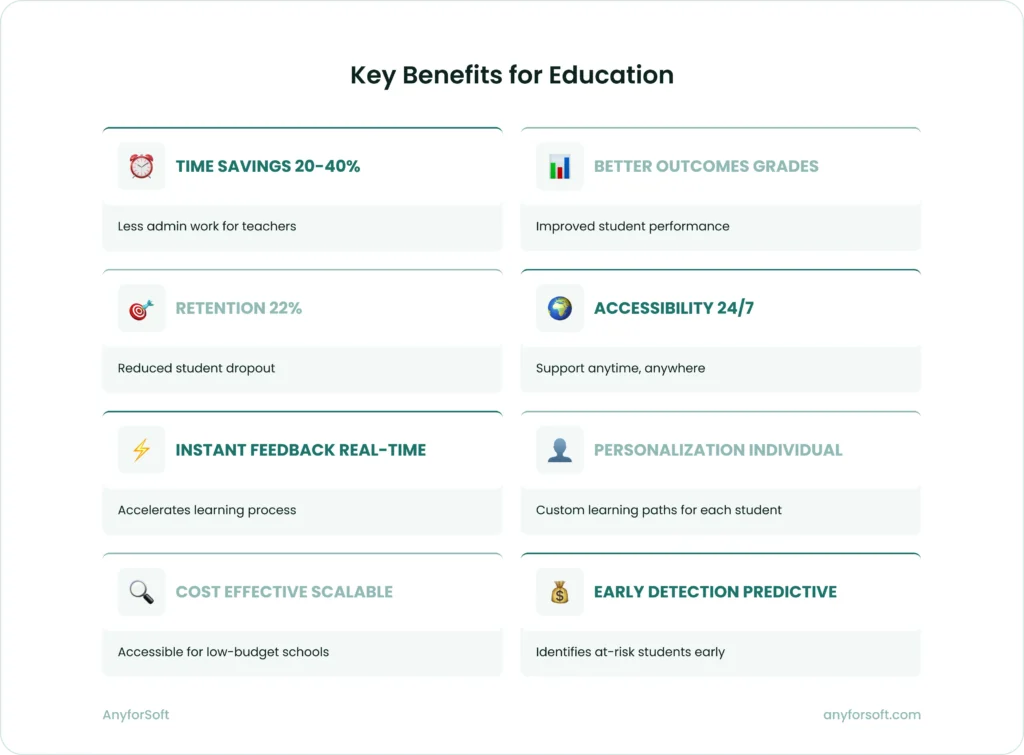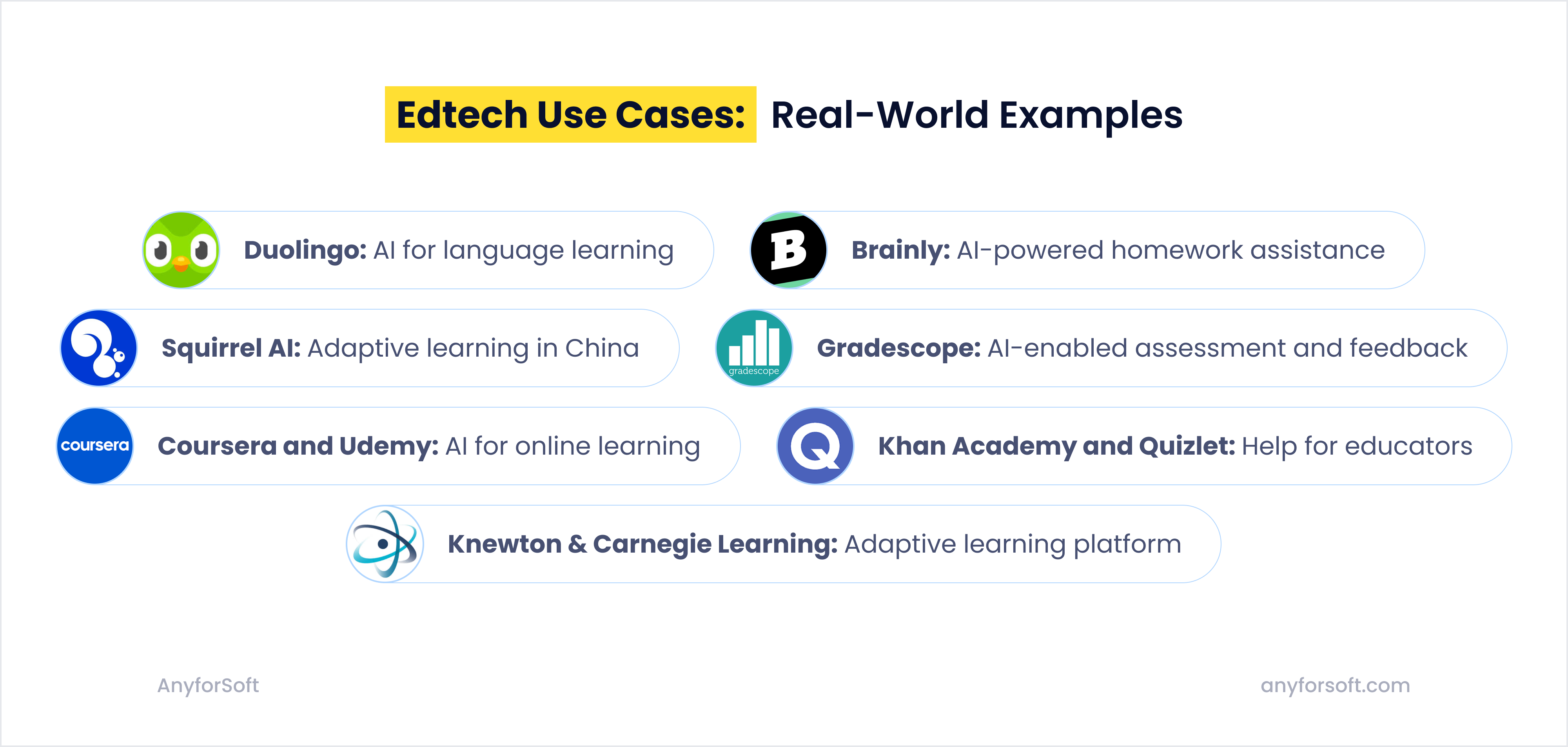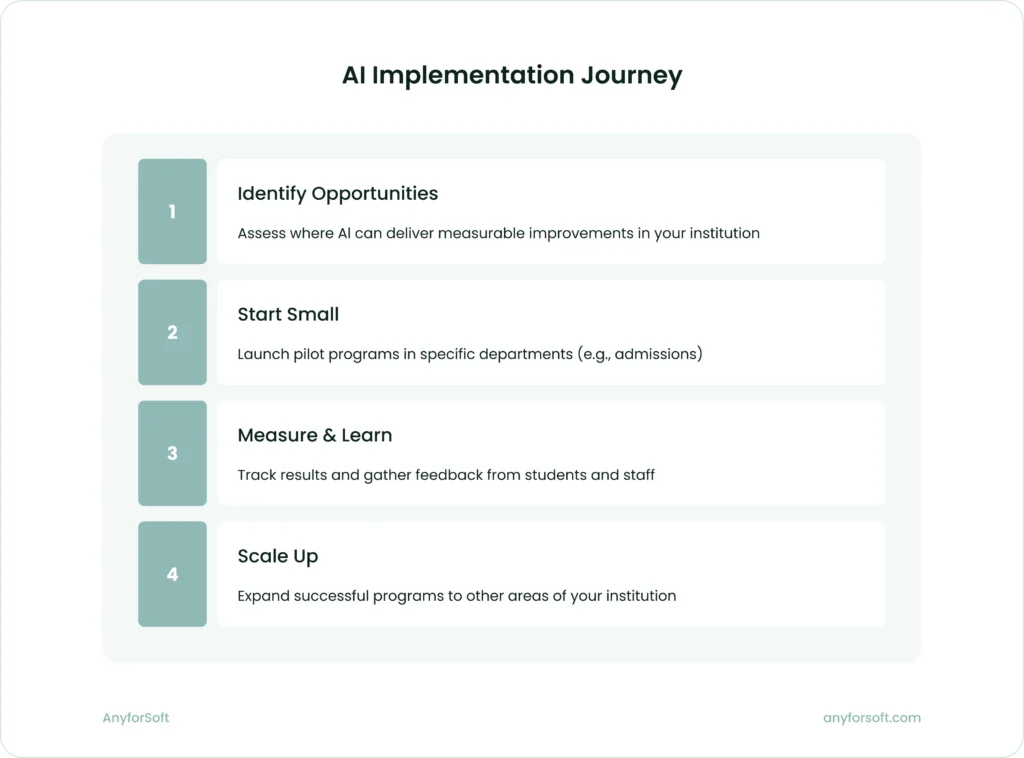Nowadays, Artificial Intelligence (AI) is everywhere, and education is no exception. Over the last few years, EdTech has started using AI to develop tools that make learning more interactive and help teachers manage their workload better. With AI, lessons can be tailored to individual learning styles, admin can be streamlined, and real-time feedback becomes much easier – making education more effective and fun for everyone involved.
For example, according to McKinsey, EdTech AI can reduce teachers’ admin tasks by 20-40% so they can spend more time with students. Meanwhile, platforms like Khan Academy and Coursera already use AI-based tutoring systems that adjust to students’ learning speed, offering personalized support to millions of users worldwide. AI-powered chatbots and virtual tutors also support teachers and keep students engaged in ways we couldn’t have imagined a few years ago.
In fact, the global market for AI in education is growing fast with experts predicting a 45% annual growth rate through 2027. So we’re on the cusp of a big change in how we learn and teach.
AnyforSoft has spent 14+ years integrating diverse tools such as LMS, SIS, CRM, and CMS across the education sector. With this expertise in mind, we share insights about the potential benefits of implementing AI into these platforms to enhance professionals’ capabilities.
AI Use Cases in Education: The Overview
Before we go any further, let’s look at some more numbers – they speak quite convincingly. The global AI in education market in 2022 was valued at around $4 billion and is projected to grow by more than 10% each year until 2032. What is driving this undoubtedly impressive surge, you may ask? As a reputable education soft dev company, we know what to answer: the growing demand for personalized learning and the recognition that AI can meet the diverse needs of today’s learners. In fact, you may not even realize that you use AI tools every day. AI is already being integrated into educational technologies in many ways, affecting various aspects of the educational process. Virtual assistants and university chatbots, intelligent tutoring systems, AI tools for automated grading, and much more. Let’s talk about it further.

Personalized learning
One of the most exciting uses of AI EdTech is its ability to personalize learning. AI systems analyze each student’s progress, learning preferences, and challenges to create custom learning paths (adapting the content and format to his unique needs). This kind of tailored approach helps students engage with the material more effectively and retain information better. DreamBox and Century Tech are strong examples of AI in education use cases that adapt lessons in real time to student performance.
AI in admissions takes personalization even further by analyzing prospective students’ academic backgrounds and career goals. It recommends the most suitable programs and learning paths before they even enroll. This helps match students to programs where they’re most likely to succeed.
This targeted matching creates significant improvements in student outcomes. It reduces dropout rates and increases both retention and graduation rates. Most importantly, it prevents students from accumulating debt in programs where they struggle academically without completing their degrees.
Intelligent tutoring systems
AI-powered tutoring systems simulate the experience of having a personal tutor by providing instant feedback and guidance to learners. Using natural language processing (NLP), these systems can interact with students, answer questions, and explain complex concepts in a clear and personalized way. The ability to offer support outside of classroom hours is an especially great thing for students who need extra help.
Some institutions like Arizona State University use AI tutoring to help prospective students prepare academically for college-level coursework. A bright example is ASU’s AI tutor Archie that helps prospective students strengthen their math skills, building their confidence before even they arrive on campus.This shows why intelligent tutoring is often listed among the best use cases for AI in higher education.
Automated grading and feedback
Grading assignments and exams is a huge time-consuming task for teachers. AI tools like Gradescope can automate the grading and assessment of student work whether it’s multiple-choice questions, essays, or even programming assignments. By reducing the grading workload teachers can spend more time with their students. EdTech AI can also provide personalized feedback on student work, highlighting areas for improvement and suggesting solutions. A fast feedback loop can accelerate learning significantly.
In admissions offices, AI provides consistent assessment criteria across thousands of applicant files. It flags incomplete documentation automatically. Suspicious or potentially fraudulent submissions get marked for human review. For international students, AI standardizes different grading systems for faster assessment.We saw the outcomes of grading-system improvements while working on an examination platform for a company that prepares healthcare professionals. By enriching the existing platform with intelligent features, such as analytics dashboards, we saw clear potential to strengthen the company’s competitive edge and improve ROI.
Virtual assistants and chatbots
AI-powered virtual assistants can handle administrative tasks, such as answering frequently asked questions, sending reminders, scheduling meetings, managing coursework submissions, or helping to manage student data.
Tools like IBM’s Watson and chatbots are being integrated into learning management systems (LMS) to improve communication and admin. On the other hand, AI chatbots such as Ivy. provide students with info on financial aid, tuition, and other relevant stuff. These virtual assistants can be available 24/7, so students and educators always have access to the help they need.
AI chatbots have proven their efficiency in admissions by providing students with personalized round-the-clock support through sometimes cumbersome procedures. Georgia State University’s Pounce chatbot texts students about missing documents and deadlines, resulting in a summer melt reduction by 22%. Another example is Southern New Hampshire University’s AI assistant Penny. It guides over 125,000 students in a year through enrollment steps with 97% opt-in rates.
When it comes to enrollment, our case study with a SaaS partner showed how enhanced features, such as a React-based virtual campus tour, can spark greater student interest and lead to a noticeable rise in applications.
Smart content creation and recommendation
For educators, AI tools built through modern EdTech app development can help create learning materials like quizzes, study guides, and even textbooks, tailoring content to specific learning objectives. This not only saves them time but also ensures that the content is up-to-date and relevant. AI-driven content creation can also develop interactive simulations and virtual labs, providing students with engaging and immersive learning experiences.
In turn, AI-powered content recommendation systems can suggest relevant learning materials and resources based on a student’s interests, preferences, and performance.
For prospective students, AI generates personalized admissions materials and program recommendations based on engagement patterns. If someone spends time browsing engineering pages but shows interest in design content, the system might suggest industrial design or user experience programs they hadn’t considered.Tailored course materials and recommendation engines highlight new use cases of AI in learning content delivery.
Adaptive assessments
Standard tests can often be incongruous with the different learning styles of students. AI in EdTech can also produce easy to difficult questions that depend on the student’s performance within the assessment. This way avoids cases where the learner is given very tough questions that he fails to answer correctly, or vice versa, too easy questions that the learner answers correctly without much effort.
Gamification
Gamification learning methods are no longer a novelty. However, AI EdTech systems have scaled this opportunity to the next level, offering something that once seemed outlandish. Creating an engaging and interactive learning experience through gamification helps to increase learner motivation, improve retention, and make learning more enjoyable.
Creating an engaging and interactive learning experience through gamification helps increase motivation and retention, which are the most practical examples of AI in education today.
Benefits of AI in Education
Reading about use cases of AI you can clearly see the benefits it provides for both students and educators. Now, let’s examine the main ones more closely.

- Data-driven insights
One of AI’s major advantages of AI EdTech is its ability to process and analyze vast amounts of data. For educators and institutions, this means getting insights into student performance and engagement to make changes and improvements to lesson plans and course materials. By identifying learning gaps and trends, AI helps teachers tailor their approach to meet students’ needs more effectively. Identifying gaps and adapting lesson plans in real time are clear examples of artificial intelligence in education that enhance teaching outcomes.
- Enhanced teacher productivity and efficiency
As we mentioned above, artificial intelligence is a great assistant in automating processes. By automating tasks like grading and content creation, AI frees up educators’ time, allowing them to focus on lesson planning, student mentoring, and individualized instruction.With the development of generative AI in EdTech, the efficiency of teachers can be increased even more by using those systems to help develop a curriculum and individual learning plan — an important application of AI in education that supports educators directly.
In the future, we may find out how useful and effective this has been in improving the quality of teaching and the relationship between students and teachers.
- Improved student outcomes
One thing that most agree on is the fact that graduates have more success when they receive personalized support. Artificial Intelligence helps students understand complex concepts and absorb knowledge which leads to effective learning.Personalized tutoring and adaptive coursework are compelling examples of artificial intelligence in teaching and learning that boost achievement.
- Greeter accessibility
AI-based tools would remove learning barriers, especially for disabled students. For instance, AI systems can convert text to speech, provide captions for video content, and translate materials into various languages. This inclusivity helps ensure that all students have equal access to quality education, regardless of any physical or learning challenges they may face.
- Continuous feedback for students
AI systems provide instant feedback, helping students understand their mistakes and learn from them in real time. This ongoing feedback loop boosts learning by allowing students to track their progress and see where they need improvement. It’s a powerful way to foster a growth mindset in learners.Instant corrections and ongoing performance tracking are strong artificial intelligence in education examples that encourage steady improvement.
- Scalable education solutions
One of the most promising aspects of AI in EdTech is its scalability. AI-driven platforms are able to deliver customized education to massive numbers of learners at once around the world. This democratization of education is especially helpful for certain regions that suffer from a lack of schooling and education accessibility.
Delivering personalized learning to thousands at once ranks among the most powerful artificial intelligence applications in education.
- Increased engagement and motivation
Interactive learning experiences and gamified learning platforms powered by AI make the learning process more interesting and fun, motivating students to actively participate in their education.
- Cost-effectiveness
Finally, AI-driven solutions can reduce costs associated with traditional educational methods, particularly in remote or distance learning settings.Cloud-based platforms and adaptive e-learning modules are accessible AI in the classroom examples that lower costs for schools.
Interested in EdTech app development?
AI Use cases in Education: Real-World Examples
The market is full of practical AI in education use cases, from adaptive learning platforms to AI-powered homework assistants. Above, we have already referred to several of them. Next, we’ll provide a few more examples of EdTech AI projects that will certainly be of interest to you.

Duolingo: AI for language learning
Probably everyone reading this article has heard of (let alone used) Duolingo at least once in their lives. This popular language-learning app is known for offering personalized lessons based on users’ progress and language proficiency. It adapts the level of difficulty according to the learner’s responses. Besides, the implemented AI allows to make the learning process easier and more interesting with the help of gamification and feedback.
Squirrel AI: Adaptive learning in China
Squirrel AI, a known EdTechAI company from China, uses technology to provide an adaptive learning experience for K-12 students. An AI-based platform that adjusts content to meet each student’s own learning needs, abilities, and collaborative work, in order to assure better learning outcomes.
Coursera and Udemy: AI for online learning
Coursera, a leading online platform for learning, suggests new courses based on a user’s skills, interests, and learning patterns. The platform’s AI algorithms also assess the learning progress of students during courses and provide personalized feedback that is used to enhance the efficiency rate of course completion.
Udemy works similarly: analyzing user behavior and providing relevant learning materials and resources suggested for a student based on their interests and learning preferences.
Brainly: AI-powered homework assistance
Brainly, the popular EdTech platform, leverages AI to assist students with their homework. This AI system helps answer questions in real time and guides students through even the most complex problem-solving processes.
Knewton: Adaptive learning platform
Knewton Alta is an AI-driven adaptive learning platform, that customizes educational content to match each student’s unique learning style and pace. Its AI engine continuously learns from the student’s progress, therefore providing highly accurate recommendations for future lessons that warrant study.
You may also hear of Carnegie Learning, which can also personalize the learning experience for each student by modifying the content and pacing according to their needs and performance.
Gradescope: AI-enabled assessment and feedback
Gradescope – an AI-based assessment and feedback tool that can automate the grading process and provide timely, detailed feedback to students.
Khan Academy and Quizlet: Help for educators
Khan Academy and Quizlet can be good examples of how AI can be utilized in Edtech for the purpose of teachers: the former uses AI for math and science practice exercises, while the latter enables you to generate personalized study sets and practice quizzes.
And this is not all that indicates to us that the future of educational technology is exciting. AI EdTech startups are also coming within the ambit of developing promising VR education and AI tutoring solutions.
AI Tools and Platforms Used in Education
AI-based educational technology is powerful in integration, showing the scope of AI used in education today. Solutions enhance existing platforms by adding intelligent capabilities. Professionals remain the decision-makers while AI handles routine tasks and derives insight from the piles of data, structured and unstructured.
LMS integrations
Learning management systems like Canvas, Blackboard, and Moodle form the backbone of course delivery. AI integration transforms these platforms from static repositories into intelligent learning ecosystems. These systems adapt to individual student needs automatically.
Critical integration strategies include:
- Predictive analytics that identify at-risk students before grades decline.
- AI chatbots embedded within LMS interfaces for 24/7 student support.
- Content recommendation engines suggesting materials based on learning patterns.
- Automated progress tracking across multiple courses simultaneously.
Take Knewton Alta’s integration with Canvas as an example. Students access adaptive exercises directly through their familiar course interface. The AI continuously adjusts problem difficulty based on performance patterns while feeding progress data back to Canvas gradebooks. Instructors receive detailed analytics about individual and class-wide learning gaps without leaving their standard LMS workflow.
In essence, LMS integrations transform static course platforms into adaptive learning environments while preserving the familiar interfaces educators and students already know.
Building a strong digital foundation is often the first step toward successful AI adoption. For example, while collaborating with Wittenborg University of Applied Sciences, we rebuilt a mobile-first Drupal 10 site, improved search relevance, and met Core Web Vitals. These functional blocks enhanced editors’ capabilities to publish content faster while students got a clearer path to content.
Similarly, at Imperial College Business School we stabilized website performance, organized navigation, and delivered custom modules. Enhanced functionality now makes layering AI features far easier.
CRM/SIS integrations
Student information systems (SIS) and CRM platforms, often forming the backbone of a student portal, contain vast amounts of enrollment, academic, and engagement data. AI integration transforms this information into actionable insights for admissions.
Essential integration methods encompass:
- Predictive modeling within Slate and Salesforce Education Cloud for enrollment forecasting.
- Automated workflow triggers for personalized student outreach sequences.
- Early warning systems that flag academic performance patterns in SIS data.
- International credential evaluation and document authenticity verification.
- Financial aid optimization based on academic potential and need indicators.
Consider how Civitas Learning integrates with university SIS platforms like Banner or PeopleSoft. The system continuously analyzes academic records, course enrollment patterns, and engagement metrics, aiming to identify students at risk of dropping out. When specific risk indicators trigger alerts, advisors receive automated notifications with recommended strategies on how to handle the issue. The main benefit is that integration happens seamlessly through existing data feeds, requiring no additional data entry from staff.
Looking at the bigger picture, CRM and SIS platforms, enhanced by AI features, provide comprehensive student insights across multiple touchpoints. As a result, decision makers make decisions throughout enrollment, retention, and academic success initiatives faster and more efficiently. This is an example of how AI applications in education directly impact retention and enrollment success.
Communication platform integrations
Email systems, messaging platforms, and collaboration tools become intelligent engagement channels when enhanced with AI capabilities. These integrations personalize communication at scale while maintaining authentic tone and appropriate timing.
Core integration approaches feature:
- AI-powered meeting assistants in Microsoft Teams and Zoom for automatic summaries.
- Personalized email campaigns that adapt to student preferences and engagement history.
- Multi-channel chatbot systems for coordinated outreach.
- Automated translation and cultural adaptation for international student communications.
- Collaboration pattern analysis in platforms like Slack to identify team dynamics.
Look at how Drift’s conversational AI works within university websites and email systems. Prospective students encounter intelligent chatbots when browsing program pages or checking application status. These chatbots integrate with CRM systems to access personalized information about each visitor’s interests and application progress. When conversations require human expertise, the system seamlessly transfers context to admissions counselors through platforms like Slack or Microsoft Teams.
To put it simply, communication platform integrations enable personalized, multi-channel engagement at scale. These systems maintain authentic connections between institutions and students across all touchpoints.
Assessment tool integrations
One of the examples of practical use cases of AI are assessment platforms. When enhanced with intelligent automation, they provide more accurate evaluations while streamlining grading workflows.
Key integration capabilities contain:
- Advanced plagiarism detection beyond text matching to identify paraphrasing and AI-generated content.
- Automated proctoring systems integrated with existing testing software.
- Competency tracking across multiple courses and learning experiences.
Consider Gradescope’s AI integration with university LMS platforms like Canvas or Blackboard. The system analyzes student responses and groups similar answers together. This way, instructors can evaluate one response and apply that assessment to all matching submissions simultaneously. The platform uses optical character recognition to process handwritten text and mathematical notation, converting them into digital format for easier review. For standardized question types like multiple choice or programming assignments, the system provides automatic scoring.
Overall, AI-powered assessment tools speed up workflows and provide deeper insights into learning outcomes. From a broader view, these systems help maintain academic integrity standards across institutions, demonstrating effective AI use in education across multiple contexts.
Conclusion
Personalized learning transforms versatile approaches to education into something more valuable: adaptive experiences that respond to individual student needs and learning patterns.
Here is the brief overview of the advantages of AI implementation in the EdTech domain – as a quick reminder and a set of AI in education examples:
- Intelligent automation of key processes through different domains, such as grading and document processing in admissions. AI decreases administrative burdens while keeping a human in the loop as a decision maker.
- Virtual tutoring systems serve students’s needs round-the-clock – personalized assistance that strengthens learners’ knowledge and self-confidence on each step of their journey.
- Predictive analytics identify at-risk students early through patterns like declining grades, reduced attendance, or decreased engagement. It ensures timely interventions of educational personnel that, in turn, prevents dropouts and maintains retention rates.
In sum, these AI use cases in education enhance human capabilities rather than aiming to replace educators entirely.

To achieve value from this technology, start by identifying areas where AI integration could deliver measurable improvements. Consider starting with pilot programs in specific departments. Admissions could be a reasonable starting point since the pressure of the routine here is immense while the performance impacts revenue directly.
Expanding gradually from the most promising areas saves time, effort, and budget.
Ready to integrate AI into your educational technology stack? Contact our team to explore how these solutions can enhance your institution’s workflows.
FAQs
Can AI help identify students who are falling behind?
AI technology can spot early warning signals by analyzing patterns across a wide range of student data. Systems track measures such as how often students log in, when they submit assignments, and how actively they join online discussions. When these indicators are paired with grades or test scores, the technology can highlight students at risk long before traditional methods detect issues. Predictive models compare current behaviors with the profiles of students who have previously struggled or dropped out. As a result, advisors receive alerts recommending concrete actions, making timely intervention far more feasible.
What types of AI are most common in education today?
The most widely used tools are embedded within learning management platforms, where AI extends their functionality. Virtual assistants and chatbots take over routine inquiries and provide around-the-clock support across several channels. Adaptive learning systems reshape content pacing and difficulty to match each learner’s progress. Automated grading software evaluates everything from simple quizzes to advanced coding tasks, ensuring consistent feedback even when serving very large groups of students. These applications of artificial intelligence in education are already making a difference.
Is AI accessible for low-budget schools and institutions?
Many solutions connect smoothly to systems schools already use, avoiding the need for new equipment or major upgrades. Subscription-based cloud services allow institutions to pay only for the scale they require. Some companies design flexible pricing models for smaller organizations, and others maintain free versions with core functions included. Institutions often begin with small pilot projects, proving the effectiveness of AI used in education before expanding to cover the entire system.
Can AI tools support teachers or only replace tasks?
Rather than substituting for educators, AI strengthens their capacity. Administrative duties such as marking work or compiling progress reports are shifted to machines, giving teachers more space for mentoring, lesson design, and creative instruction. Data-driven insights reveal gaps in understanding and point to needed instructional adjustments. The technology works as an assistant, amplifying teacher impact while preserving the central role of human judgment and relationships.
Are students comfortable learning from AI-based systems?
Student reactions differ depending on how the technology is applied and which tools are chosen. Comfort levels rise when AI provides practical help, such as tailored practice tasks or instant corrections, rather than appearing intrusive. Clear explanations of how the system functions and which data it uses increase trust and engagement. In general, students respond positively to features that save time or give immediate guidance, such as adaptive study platforms or quick-answer chatbots.
